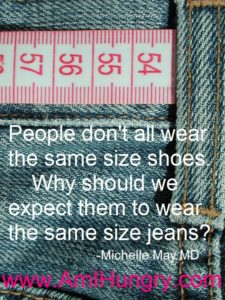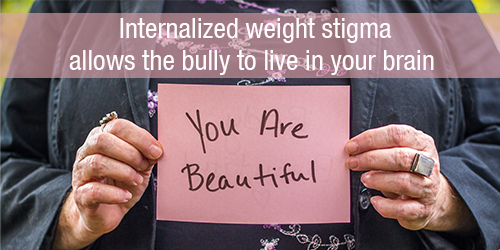In Ending Weight Stigma Part 1, I introduced the topic of weight stigma and explored the harms it causes. In Part 2 we’ll look at specific strategies for addressing internalized weight stigma.
In my work with people who struggle with food and body image, I have conversations about the impact of weight stigma with my clients several times a week. I explain that weight stigma is a social justice issue, that weight stigma is not their fault, that weight loss is not the solution, and that internalized weight stigma allows the bully to live in their brain.
But as I write this article, a commercial for a weight loss drug is running in the background on TV. No wonder they feel confused and conflicted!
Imagine!
The ultimate solution is to rid the world of weight stigma. Given that weight stigma is deeply rooted in weight bias, racism, classism, sexism, and healthism, this is likely to be a long process.
Still, imagine people of all sizes living free of bias and stigma! That is a world I want to live in. It will require effort on numerous fronts, each of us wielding our influence (large or small) in whatever spheres we travel.
Given that my work is centered on helping people resolve their conflicted relationships with food and their bodies, much of my focus is on helping individuals recognize and resolve internalized weight stigma. We simply can’t wait on the world to change!
In this article, I’ll share some of steps for reducing internalized weight stigma. Please remember, undoing the harmful messages you’re bombarded with is a process. Be patient and gentle with yourself (and angry with a culture that has promoted weight stigma!).
(I wish to acknowledge that I although I am passionate about this topic, it is from a place of privilege, having never experienced the oppression that many others experience based on their body size, race, sexuality, and other intersecting stigmatized identities. I am still learning and welcome any feedback.)
Learn the truth about weight bias.
The research is clear: Weight stigma is harmful and weight stigma in healthcare can even be deadly!
This is why Am I Hungry? is committed to a weight-neutral approach. I am happy to say we are part of a large movement of health and wellness professionals who have made this shift.
Confront internalized weight stigma.
While you cannot control what others think, say, or do, you can begin to address your thoughts and beliefs.
Catch yourself when you are judging yourself (and others) about weight. Don’t judge yourself for these thoughts; recognize that you too have been conditioned by our fatphobic culture.
You may not even be aware you’re having these thoughts until you notice you’re feeling shame about your body. Work on replacing judgment with more realistic and compassionate messages, like:
- Bodies come in all shapes and sizes.
- Health comes in all shapes and sizes.
- Beauty comes in all shapes and sizes.
- All bodies are acceptable, including mine.
- I honor and accept my body.
Don’t participate in conversations about weight.
Don’t comment on other peoples’ bodies. Even complimenting someone on weight loss reinforces the message that smaller bodies are better than larger bodies.
Depending on how you resilient you feel, when others discuss weight-related topics, change the subject, challenge statements that equate body size with health or attractiveness, or simply walk away.
Set boundaries about discussing your body size and behaviors.
Even if well-intended, unsolicited advice about diet, exercise, and health (also called “concern trolling” or “body policing”) is another form of weight stigma.
Where needed, here are examples of thoughts and statements that may help you set boundaries with others.
- My self-esteem does not depend on the opinion of others.
- If someone judges me by external attributes, it says more about them than me.
- Everyone deserves to be fully seen and heard without judgment.
- My body, my business.
- Keep your comments to yourself.
Advocate for weight-inclusive healthcare.
Admittedly, it is challenging to address (and sometimes recognize) weight stigma in healthcare settings. Your provider’s education, perceived authority, and apparent confidence in their weight loss recommendations can make it difficult to advocate for yourself.
And to be clear, you shouldn’t have to!
High levels of anti-fat bias in healthcare providers result in poorer care and worse outcomes. (This is one explanation for the correlation between weight and health.) Therefore, if you are not receiving the care you deserve, it is essential to advocate for yourself—or find a different provider.
Ragen Chastain created a great resource for what to say at the doctor’s office. These cards will help you get appropriate evidence-based care—which you deserve and should be getting anyway!
(I’ve had the privilege of speaking to health care professionals about “Making the Shift from Weight-Centered to Weight-Inclusive Care” and recently co-authored an evidence-based article for a nutrition journal on that topic. It’s a start!)
Beware of healthism.
Healthism is the belief that a person’s health is entirely their responsibility and places moral importance on maintaining good health. But not everyone has the privilege of being healthy; their health may depend on factors beyond their control. Further, not all people wish to engage in behaviors others think they should.
When people in large bodies are deemed acceptable as long as they are healthy and/or practicing “healthy” behaviors, that is healthism. You have the right to pursue optimal health—but not the obligation.
Bottom line: A person’s health is nobody else’s business and should not be used as another excuse for judging or discriminating against others.
Practice radical self-acceptance.
Without a doubt, it is hard living in a larger body in a culture that worships thinness and demonizes fatness.
Buying in to society’s fatphobic messages leads to distorted, irrational, unrealistic, and painful beliefs and feelings about yourself and your body. Repeating these messages to yourself strengthens them, leading to lowered self-esteem, guilt, shame, and feeling that you are undeserving of the things you deeply desire. In other words, internalized weight stigma invites the bully into your brain.
Most important, postponing your life until you reach some arbitrary or outward definition of success, beauty, or health consumes your precious time, energy, and focus. It dismisses your intrinsic self-worth.
It’s a radical act to accept yourself as you are in a culture that says you shouldn’t!
Accept who you are and where you are right now. Certainly, there may be things you want to work on, but it’s important to accept yourself unconditionally first—no strings attached. Self-acceptance breeds self-care.
Resist comparison
 In a society that promotes unrealistic physical ideals, it may be difficult to resist comparing your body to others. The media, with computer enhanced models and celebrities whose careers depend on their looks, can distort your perception of what is “normal.” It’s no wonder that women, and increasingly men, suffer feelings of inadequacy about their shape.
In a society that promotes unrealistic physical ideals, it may be difficult to resist comparing your body to others. The media, with computer enhanced models and celebrities whose careers depend on their looks, can distort your perception of what is “normal.” It’s no wonder that women, and increasingly men, suffer feelings of inadequacy about their shape.
These distortions may have been reinforced over time by friends, family members, and health and wellness professionals. Chronic yo-yo dieting contributes to weight cycling, disordered eating, eating disorders—and more weight stigma. When the promised results are not achieved, anxiety, depression, guilt, and self-degradation can result.
Besides, when you compare yourself to others, you are not just judging yourself, you are also judging them by their external appearance – perhaps a form of reverse weight bias.
When you notice you are comparing, judging, or criticizing, gently bring yourself back to non-judgmental awareness. Bodies come in all different shapes and sizes. Choose to respect and appreciate this natural body diversity.
Ban body bashing.
When you think or say negative things about your body, your body hears you!
Harsh and judgmental attitudes might cause you to delay self-care, waiting until you feel that you are more deserving. As long as you are at war with your body, it will be difficult to find peace with yourself and food. With every disparaging glance in the mirror comes the promise of “just one more diet.”
When you become aware that you are saying unkind things about yourself, ask, “Would I say these things to a friend?” If you wouldn’t, don’t say them to yourself either. Let me take that one step further. Replace negative statements with positive, or at least neutral, messages.
Respect your body.
Your body is complex and intricately designed. It is capable of performing complex tasks, doing great work, getting you where you want to be, and experiencing physical pleasure. In turn, you can choose to respect and appreciate what your body does for you.
You don’t have to like every part of your body to respect it. Respecting your body means treating yourself with dignity, caring for your overall well-being, and listening to your body’s needs. Examples of respectful body message include:
- My body deserves to be fed and taken care of.
- My body deserves to be treated with respect and appreciation.
- I am more than a body.
And, expect the respect you deserve from others too!
Live the big, vibrant life you crave today!
 Instead of putting your life on hold because you don’t meet some arbitrary, culturally-conditioned definition of beauty or health, remind yourself that this is your life and you deserve to live it fully.
Instead of putting your life on hold because you don’t meet some arbitrary, culturally-conditioned definition of beauty or health, remind yourself that this is your life and you deserve to live it fully.
Eat fearlessly and move joyfully to fuel the vibrant life you crave—and deserve!
Wear clothes that make you feel great, do things that make you feel brave, and make choices that bring you joy.
Bottom line: Boot the bully from your brain! Then you can begin to help us boot the bully from the block!
This article has been updated from a previously published version.
Enjoyed this article? Here are three more to help you:
Weight Stigma in Healthcare: When you know better, do better
Mindful Eating and Weight Loss: Setting the record straight
A Non-Diet, Weight-Neutral, Mindfulness-Based Approach to Optimal Well-Being


